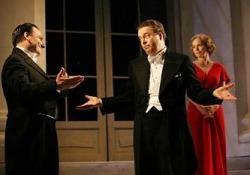Afterlife
There's nothing more irritating than a play you really can't understand because you can't see the point of it, or recognise the message it's trying to convey. And I'm afraid that, even if my intellectual capacity is at fault, this is one of those plays. It's irritating because throughout its course I kept expecting something more from it - something really important to happen. By the interval, I was actually convinced that we had all been deliberately lured into wondering what the hell was going on, and that there would be a monumental about face in the second half, that everything would really spring to life and we'd be rewarded with some philosophically important message or some gob-smacking revelations about the principal character, but nothing materialised. In fact, the worst of it was to come after the interval, proving once again that instinct is rarely to be relied on.
The play is basically about Max Reinhardt, a Jewish theatrical director with an outlandish style approaching the monumental. His lavish productions not only appeared in London and the USA, but he produced a morality play - Everyman - each year in Saltzburg.
'Afterlife' begins in 1920 with Reinhardt (Roger Allam) discussing his proposed version of the morality play with the Archbishop of Saltzburg since the play is to be performed outside his cathedral. The action then suddenly veres across to Reinhardt's mansion which he bought at a knock-down price and spent huge quantities of cash restoring over a period of 20 years. And we spend most of the rest of the play seeing Reinhardt coming and going as he disappears on tour for months at a time, returning to produce his morality play. While he's away, his mistress and secretary read his boring telegrams - many of which are just a couple of lines long - and the years roll by in a particularly repetitive way that makes you want to scream, or yawn, or both.
Once more, the English obsessions with the Nazis and the Second World War come into focus. Now of course, you might be hard pushed to discuss this director without mentioning the Nazis or their effect on the central character. But I'm not sure that necessitated the use of huge Nazi flags or a Nazi official in uniform speaking to us in rhyme. What had been described up to that point was enough to get across the menace of the Nazis without stuffing the Nazi flag once more down our throats. Most of us have seen it before!
In the end, Reinhardt's palatial home is taken from him by the Nazis - after he declined an offer (apparently from Hitler) to become an 'honorary Aryan' - and Reinhardt fetches up penniless in America writing film treatments for studios in order to get work, before meeting his demise in a seedy hotel in New York.
Though Roger Allam uses all his superb skills to make something of this play, I'm afraid it couldn't salvage the mess that Michael Frayn had created for him. Though Frayn has obviously done considerable research about Reinhardt and unearthed some intriguing facts, what happens on stage just isn't fascinating, or even very interesting. It ends up being dull, repetitive, and rather boring. It doesn't tell us anything new about human behaviour and certainly tells us nothing new about the Nazis. And it's weak as a biography because it fails to explore interesting avenues such as Reinhardt's boyhood poverty and fascination with the theatre. It's a bit like an enormous parrot in a gilded cage - it looks rather magnificent, but if the parrot doesn't talk much, or says the same thing, it's not very entertaining or illuminating.
As my colleague observed, this could easily have been the story for a rather thin musical - and indeed,The Sound of Music (not so flimsy, but a musical nonetheless) kept coming to mind over and over again while I was watching it. However, 'Afterlife' does contain some rather nice singing - even if it's not exactly in the style of Julie Andrews.
There is a modicum of humour in 'Afterlife' when Reinhardt is directing his household staff, but I'm afraid it was not enough to save this rambling contrivance. With Allam in the lead, I had great hopes for 'Afterlife', but it's disappointing at best, infuriating at worst and deserves to be consigned to the destination of the same name!
What the popular press had to say.....
NICHOLAS DE JONGH for THE EVENING STANDARD says, "Weird, dull ramble." PAUL TAYLOR for THE INDEPENDENT says, "Hollow production...disappointing dud." MICHAEL BILLINGTON for THE GUARDIAN says "While Frayn's play ripples with invention and is beautifully staged by Michael Blakemore, it is difficult to discover universal resonance in Reinhardt's career." SAM MARLOWE for THE TIMES says, "Frayn's erudition sparkles and there's a buoyant sense of fun in Blakemore's production to match its braininess." CHARLES SPENCER for THE DAILY TELEGRAPH says, "Punishing, spiritsapping production."
External links to full reviews from popular press
The Independent
The Guardian
Daily Telegraph
The Times
Production photo by Conrad Blakmore
Originally published on
